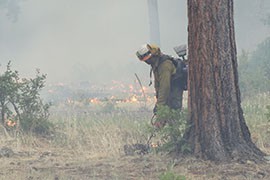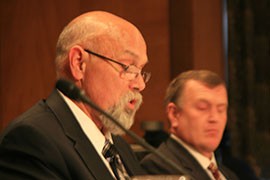Cronkite News has moved to a new home at cronkitenews.azpbs.org. Use this site to search archives from 2011 to May 2015. You can search the new site for current stories.
Emergency border funding request also asks for firefighting funds
WASHINGTON – Tucked into the president’s $3.7 billion request for funding to stem the tide of immigrant children crossing the Southwest border was a request for another $615 million to continue fighting wildfires this year.
Most agree the wildfire money is needed, but opinions split on the tactic of asking for it in the same letter as the border-funding request – what one derided as “pork-barrel politics,” another called an “understandable manuever.”
The twin requests came in a letter from President Barack Obama to Congress, in which he was expected to ask for funds to address the “urgent humanitarian situation on both sides of the Southwest border.”
That letter asked for $3.7 billion in emergency funding for a “border security surge,” repatriation of the Central American children and adults who have been streaming across the border in recent months and more immigration court resources, among other initiatives.
But just as much of the letter was dedicated to the wildfire request. In addition to asking for $615 million to fund this year’s firefighting, the letter asked for greater flexibility in how funding for wildfires is allocated.
Advocates welcomed the proposal.
“The additional $615 million will allow for more fires to be suppressed than currently possible in the U.S. Forest Service budget,” said William Dougan, president of the National Federation of Federal Employees, in an email.
“This will also allow for land-management agencies to go deeper into fire season without needing to use non-fire funds to pay for fire suppression as has happened too often in recent years,” his email said.
Jennifer Jones, a spokeswoman with the Forest Service, said the money would help cover fiscal 2014′s projected $1.61 billion in fire suppression costs. The service was appropriated $995 million for fiscal 2014, she said, and the “amount requested would make up the difference.”
Jones said the funding would be designated only to the Forest Service, and would not be distributed to service regions, such as the Southwest region that includes Arizona and New Mexico.
The letter also included a request to fund wildfires like other natural disasters, to prevent the continued practice of what is known as “fire borrowing.” Currently, when the wildfire budget is exceeded, agencies “borrow” the money from other non-firefighting accounts.
Dougan, whose organization represents more than 10,000 Forest Service employees, said including the funds as part of a broader appropriations request was “an understandable maneuver by the White House.”
“With so few work days left in the 113th Congress it makes sense to consolidate bills to expedite the legislative process,” he said in his email.
But Alex Nowrasteh, immigration policy analyst at the Cato Institute, said Congress would “vehemently” deny the president’s request because of the tough political climate surrounding immigration.
Nowrasteh said tacking wildfire suppression funds on to the immigration request was “pork-barrel politics,” and suggested it could be a way of gaining interest from border states.
“The pork inserted into the request is an example of normal political wrangling,” Nowrasteh said.
“I think no matter what happens, it’s going to be a big battle,” he said. “Both sides are very interested in blaming the other for what’s going on, and that will extend to this.”
But Rep. Ann Kirkpatrick, D-Flagstaff, said Tuesday that funding is needed for both initiatives.
Investing in wildfire suppression and prevention can prevent costly, catastrophic fires, she said in an email.
“In my district, the containment of the recent San Juan Fire is a success story because of that area’s previous treatments and forest thinning,” her statement said. “We know these efforts reduce risk and limit damage, and that’s why I’ve always urged my colleagues to vote in favor of wildfire suppression funding.”








